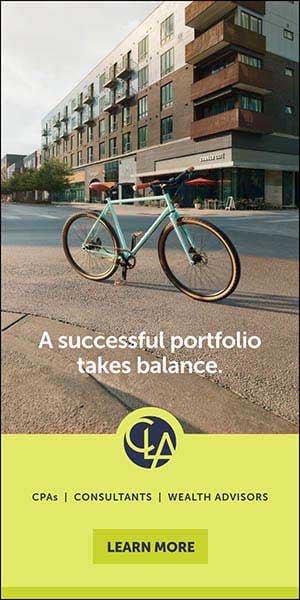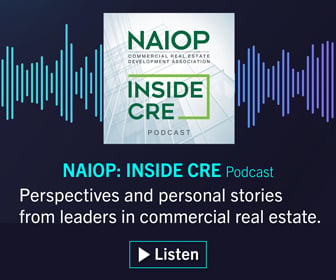
On Leadership: Nicholas L. Pell
The president and chief investment officer of Link Logistics, headquartered in New York, leads a team of 1,200 employees spread across 25 offices and manages properties located in 40 major domestic markets. Link Logistics owns the largest portfolio of U.S.-only industrial real estate with a focus on infill assets.
Development: What drew you to a career in commercial real estate?
Nicholas L. Pell: I came from a financial background, but I was eager to connect finance with the ability to source new investment opportunities. Real estate seemed a good fit for me because it is a very entrepreneurial business.
Development: How was Link Logistics formed?

Nicholas L. Pell
Pell: Link Logistics came together in early 2019. Blackstone had been investing in the industrial sector globally for decades but had sold off its U.S. industrial platform in 2016. Subsequently, it completed a few major industrial transactions prior to 2018 when it took a public REIT called Gramercy Property Trust, where I was the CIO, private. I helped construct the REIT portfolio from scratch over five years. Blackstone took Gramercy private with the idea of combining the 75 million square feet that Gramercy brought to the table with Blackstone’s 75 million square feet that it had recently aggregated. In 2019, we gathered a team of roughly 125 people and went on to purchase about $60 billion in industrial assets and hired 1,000 new team members across the country. This helped us establish the platform that we have today. Blackstone saw the need for a fully integrated operating platform in the U.S. to align with its macro thesis on industrial investments and complement its global investment expertise.
Development: Last-mile industrial facilities focusing on major markets in the U.S. is an enviable place to be. How did you come to focus on this market?
Pell: It starts with Blackstone and its macro investment thesis and its history of successfully investing in industrial real estate. In 2019, we felt that the e-commerce wave was still relatively early but detected a change in consumer behavior where people wanted, needed and expected goods to be delivered quickly. Naturally, this required more space that was proximate to where people lived and worked. At the same time, our team correctly identified a wave of development challenges to delivering new space in those same locations. It is usually a good place to be when you see a rise in demand but challenges in delivering new supply. So, our thesis of focusing on infill assets and finding the best properties we could in all major markets, which are relatively protected from new supply, was the best way to create our portfolio.
Development: Leading a company with 1,200 employees across 25 offices is challenging. How do you maintain and build your company’s culture?
Pell: Employees are a key pillar of our organization. We try to ensure everyone feels like part of the team, as it is crucial to maintaining company culture. Our main focus is to recruit the most-skilled individuals in our respective markets. In addition, we strive to provide opportunities for growth, learning, and community involvement. Our goal is to establish a strong cultural identity that fosters a sense of belonging among every employee, regardless of their location. At the same time, we aim to give our regional teams a sense of ownership and identity. Regardless of the functional area or hierarchical level, we aim to ensure every team member understands how their work contributes to the company’s overall vision and productivity.
Development: What does leadership mean to you?
Pell: Leadership has many facets, but one concept that stands out for me is service. My leadership philosophy revolves around serving the people I lead. My goal is to assist them in performing their jobs more efficiently. I always strive to make my team feel that I am working for them rather than the other way around. This approach promotes a sense of responsibility and ownership among the team members. It also creates a feeling of unity, where we all work together and move in the same direction. I believe that anything less than this approach is inauthentic. I have found this method of leadership not only productive but also personally satisfying.
Development: What is your primary role as president of Link Logistics?
Pell: My day is spent identifying new investment opportunities alongside Blackstone. I work closely with them, building a pipeline of potential investments, whether they be intriguing buildings or new development opportunities that could enhance our portfolio. I also oversee all of our disposition efforts, which is a key part of our overall real estate portfolio strategy effort. Lastly, I oversee our research team, which is responsible for the analytical work and data-science efforts within Link, where we identify trends and synthesize data into actionable investment and portfolio management decisions. We are highly data driven in running the business, and we pride ourselves on having what I believe to be the top-tier research team in our business.
Development: What qualities do you look for when hiring senior staff?
Pell: I look for leadership qualities. It’s crucial to have team members who can take ownership of management, make decisions and render sound judgment throughout the day. This kind of autonomy allows me to allocate my time to other tasks. Of course, technical expertise, attention to detail, and substantial experience in our field are also vital components. A demonstrated ability in managing complex relationships, identifying and evaluating new opportunities, time management and critical thinking are traits I value.
Development: What has been your greatest leadership challenge at Link Logistics?
Pell: The most significant challenge we have faced is the rapid expansion from around 125 people in 2019 to over 1,200 today. This kind of change is substantial for everyone, regardless of when they joined the company. Today, we’ve grown into a mature, high-functioning platform, which is what we all envisioned at the beginning. However, it took us time to assemble the right team, familiarize ourselves with the assets, and build up the expertise to make a broad impact on the business and create value. Despite being a large company, we’ve maintained an entrepreneurial spirit that I think is at the core of much of our success. We are always building, improving and pursuing excellence.
Development: How do you resolve internal conflicts or mistakes at the company?
Pell: In my leadership approach, I aim to be as direct and swift as possible in resolving problems. I strive for transparency and candidness, as I believe it’s important to call things as they are. Challenges are inevitable, and they present themselves daily. Instead of letting these issues linger, we address them promptly and work through them.
Development: What will the greatest challenges be in the logistics space in the years ahead?
Pell: Securing approvals for infill locations is a problem today and will continue into the future. People want and need the benefits that close-in warehouses offer, but most do not want a warehouse located near their residences. But to achieve swift delivery of goods and services, warehouses need to be situated close to the communities they serve. This creates a significant pain point in many urban areas, and as a developer, we witness this firsthand. We strive to collaborate with communities to address these concerns because we recognize that these goods and services are wanted, and there are jobs and opportunities that we help create with our customers. It’s crucial to remember that goods must be stored, serviced and assembled near where people work and live. Therefore, we all need to work together to find a balance.
Development: What is the best advice you have received in the commercial real estate business?
Pell: When it comes to real estate investment, more good things happen on good real estate, and more bad things happen on lower-quality real estate as cycles turn. Not to say one can’t make money buying lower-quality real estate if you get a great basis, time the market and execute a business plan, but our job is to assess probabilities and expected outcomes based on a set of assumptions. In good times, the best real estate tends to compound higher, but when things turn on lower-quality real estate, it can feel like an avalanche of problems on risks you thought were fairly remote during more stable times.
Development: What advice would you give someone entering the commercial real estate business today?
Pell: It’s imperative to show up and be on time to meetings, to flights, to events. Bring good energy, be positive, and add value to every room you are in. Real estate is still a people and relationship business, despite the evolution of data into decision-making and the ongoing institutionalization of the asset class. It’s crucial to remember that our counterparties and intermediaries are people; we’re dealing with human issues to finalize deals and overcome challenges. If you can show that you possess aptitude, capabilities and tenacity, and you’re willing to go that extra mile, you can succeed in this business.
Development: Has your involvement in NAIOP helped you develop your leadership skills?
Pell: I’ve been a member of NAIOP for over a decade now, and almost from the start, I’ve participated in one of the National Forums. I joined the Forum about a year into my membership, and it’s been a wonderful experience. I’ve remained in the same Forum throughout my membership. Over the years, I’ve developed strong relationships with the other members. We have grown up together in the industry and shared best practices and insights and advice, both professionally and personally. We often collaborate, buying and selling from each other. The Forum has fostered not just professional connections, but also friendships and a sense of camaraderie in our line of work.
Development: What crucial lessons have you learned during your time in the commercial real estate business?
Pell: There’s always something. By that I mean there’s rising interest rates, there’s labor strikes, there’s politics and there’s pandemics. In this dynamic world of ours, we must be well-prepared and flexible to deal with uncertainty. This means being intentional and measured in our approach to buying and selling assets, deploying capital and predicting potential outcomes. Remember, however, that uncertainty isn’t entirely negative. It often leads to dislocation, thereby creating opportunities.
Development: Leading a firm like Link Logistics must be challenging. What are your interests away from work?
Pell: I have a wonderful wife and two children — a 13-year-old daughter and a 10-year-old son. I spend as much quality time as possible with my family. My personal preference for spending leisure time revolves around being outdoors. From skiing and fishing to cycling, I find great joy in these outdoor activities. I actively contribute to the community as a board member of a nonprofit organization. This organization is responsible for the two music festivals held in Newport, Rhode Island, namely the Newport Jazz and Folk Festivals. Having grown up in Newport, it’s a great way to stay connected to my hometown and stay current on music.
Ron Derven is a contributing editor to Development magazine.
RELATED ARTICLES YOU MAY LIKE

From the Editor: As the Economy Improves, What’s Next for CRE?
As of this summer, it appears that the Fed may have engineered a soft landing for the U.S. economy.
Read More
Worth Repeating
Sounds bites from NAIOP’s I.CON East, held June 7-8 in Jersey City, New Jersey.
Read More
CEO on Leadership: Andrew VanHorn
The new president and chief development officer for Dweck Properties in Washington, D.C., talks about leadership, culture and growing a new commercial real estate company focused on multifamily.
Read More



